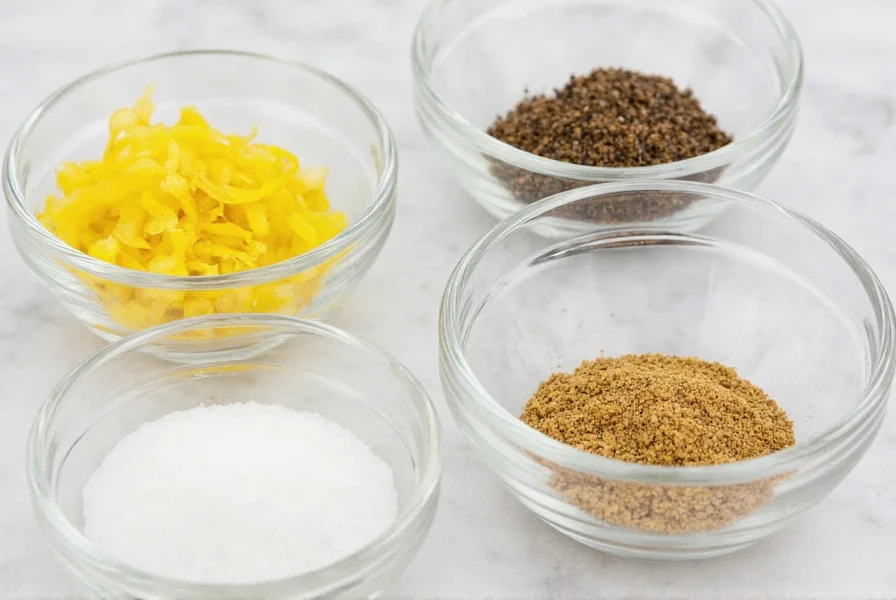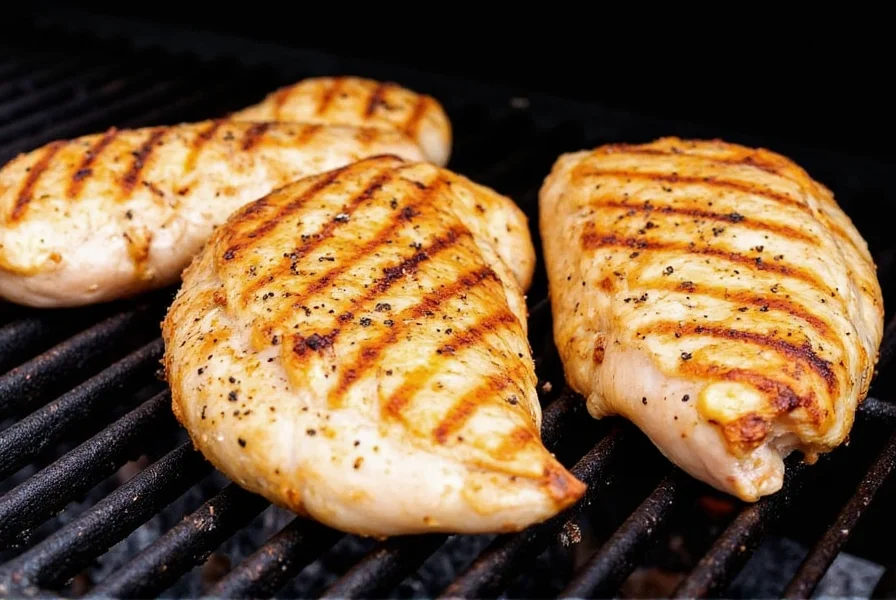A well-crafted lemon pepper rub transforms ordinary proteins and vegetables into restaurant-quality dishes with minimal effort. Unlike liquid marinades that can make surfaces too wet for proper searing, dry rubs like this create a flavorful crust while maintaining texture. The magic happens through the perfect balance of citrus brightness from lemon and the sharp warmth of freshly cracked pepper.
The Essential Components of a Quality Lemon Pepper Rub
Understanding each ingredient's role helps you create a superior rub. While commercial versions exist, homemade blends offer superior freshness and customization.
| Ingredient | Function | Recommended Form |
|---|---|---|
| Lemon zest | Provides bright citrus flavor without acidity | Freshly grated (dried lemon peel as alternative) |
| Black pepper | Creates warm, complex heat | Coarsely ground (not pre-ground) |
| Sea salt | Enhances all flavors and helps form crust | Kosher or flaky sea salt |
| Garlic powder | Adds savory depth | High-quality, fresh powder |
| Onion powder | Complements garlic with sweet undertones | Fresh powder (not clumped) |
Perfect Homemade Lemon Pepper Rub Recipe
This chef-tested formula creates a balanced rub that works for most applications. The measurements yield approximately 1 cup of rub, enough for 4-6 chicken breasts or fish fillets.

Basic Recipe
- 2 tablespoons fresh lemon zest (from about 3 lemons)
- 3 tablespoons coarsely ground black pepper
- 2 tablespoons kosher salt
- 1 tablespoon garlic powder
- 1 tablespoon onion powder
- 1 teaspoon dried thyme (optional)
- 1 teaspoon paprika (optional for color)
Instructions: Combine all ingredients in a small bowl. Mix thoroughly until uniformly colored. For best results, let the mixture sit for 30 minutes before use to allow flavors to meld. Store in an airtight container away from light and heat.
When Fresh Lemon Zest Matters Most
While dried lemon peel works in a pinch, fresh zest delivers superior flavor. The oils in lemon zest contain the most potent citrus compounds. When grating:
- Use a microplane for fine, even zest
- Avoid the white pith (it's bitter)
- Zest lemons before juicing them for other recipes
- For extended shelf life, freeze zest in ice cube trays with water
Best Applications for Lemon Pepper Rub
This versatile seasoning shines on various proteins and vegetables. Understanding proper application techniques ensures optimal results.
Protein Pairings
- Chicken: Works exceptionally well on chicken breasts, thighs, and whole roasted chicken. Apply generously 30 minutes before cooking.
- Fish: Perfect for salmon, cod, and halibut. Use a lighter hand with delicate fish like sole.
- Shrimp: Creates a flavorful crust when grilled or sautéed. Toss raw shrimp in rub before cooking.
- Pork: Complements pork tenderloin and chops beautifully.
Vegetable Applications
Toss vegetables like asparagus, zucchini, or bell peppers with olive oil and a light coating of lemon pepper rub before roasting. The rub caramelizes beautifully, creating complex flavor layers.
Common Lemon Pepper Rub Mistakes to Avoid
Even simple rubs can go wrong with improper technique. Steer clear of these common pitfalls:
- Applying too early: Salt can draw out moisture if applied more than 1 hour before cooking chicken or fish. For best results, apply 20-30 minutes before cooking.
- Using pre-ground pepper: Pre-ground pepper loses volatile oils quickly. Always use freshly cracked pepper for maximum flavor impact.
- Over-rubbing delicate proteins: Use a lighter hand with fish like tilapia or sole to prevent overpowering their delicate flavor.
- Storing improperly: Keep your rub in an airtight container away from light and heat. Properly stored, it maintains peak flavor for 2-3 months.
Variations for Special Dietary Needs
Customize your lemon pepper rub for different dietary requirements without sacrificing flavor:
- Salt-free version: Replace salt with equal parts mushroom powder for umami depth
- Lemon-forward version: Increase lemon zest to 3 tablespoons and add 1 teaspoon lemon oil
- Extra heat version: Add 1/2 teaspoon cayenne pepper or crushed red pepper flakes
- Herbaceous version: Incorporate 1 tablespoon each of dried dill and parsley
Storage and Shelf Life Guidelines
Proper storage maintains your rub's potency. Store in a cool, dark place in an airtight container. For extended shelf life:
- Refrigerate for up to 6 months
- Freeze in ice cube trays with a bit of oil for portioned use
- Check freshness by rubbing a small amount between fingers - it should release a strong aroma

Why Homemade Beats Store-Bought
Commercial lemon pepper seasonings often contain fillers like maltodextrin, anti-caking agents, and excessive salt. Homemade versions give you control over:
- Ingredient quality
- Salt content
- Pepper coarseness
- Flavor balance
- Freshness
The difference becomes especially apparent when cooking at high temperatures - homemade rubs caramelize beautifully without burning, while commercial blends often contain sugar that can scorch.
Frequently Asked Questions
Can I use lemon juice instead of lemon zest in my rub?
No, lemon juice doesn't work well in dry rubs as it creates moisture that prevents proper searing and can make the rub paste-like. Lemon zest contains the flavorful citrus oils without the water content, making it ideal for dry rubs. If you must substitute, use dried lemon peel instead of fresh juice.
How long should I let the rub sit on chicken before cooking?
For best results, apply lemon pepper rub to chicken 20-30 minutes before cooking. This allows the salt to begin penetrating the surface without drawing out excessive moisture. Avoid leaving the rub on for more than 1 hour, as the salt can start to cure the chicken surface, affecting texture.
What's the difference between lemon pepper seasoning and lemon pepper rub?
Lemon pepper seasoning typically refers to a finer powder blend meant for finishing dishes or adding to liquids, while a rub has coarser ingredients designed to create a crust on proteins during cooking. Rubs contain larger pepper granules and often more salt to facilitate crust formation.
Can I use this rub for vegetarian dishes?
Absolutely. Lemon pepper rub works wonderfully on roasted vegetables, grilled portobello mushrooms, and even tofu or tempeh. For plant-based applications, you might reduce the salt slightly since vegetables generally require less seasoning than proteins.











 浙公网安备
33010002000092号
浙公网安备
33010002000092号 浙B2-20120091-4
浙B2-20120091-4